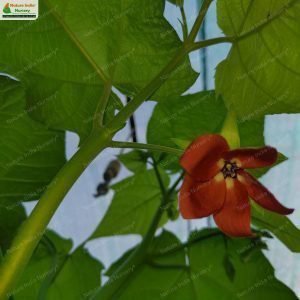Miliusa tomentosa, commonly known as Hoom, is a large deciduous tree that can grow up to 30 meters tall. The tree is native to the Indian subcontinent, including India, Bangladesh, Nepal, and Sri Lanka. It primarily grows in seasonally dry tropical biomes. The tree has a blackish-brown bark and thick, leathery, ovate leaves that are smooth above and softly hairy below. The tree produces greenish flowers, which are solitary or in pairs, and dark purple, nearly spherical fruits.
The Hoom tree plays a role in supporting local wildlife, with its greenish flowers attracting various pollinators and its dark purple fruits providing food for some bird species. The leaves are also a food source for butterflies such as the Tawny Rajah, Tailed Jay, Common Jay, Spot Swordtail, and Narrow Banded Bluebottle. The tree’s medicinal properties, phytochemical properties, and edible fruits make it a valuable resource for local communities.
Habitat
Miliusa tomentosa is native to the Indian subcontinent, including India, Bangladesh, Nepal, and Sri Lanka.
Planting and Care
-
Propagation Methods: Can be propagated from seeds.
-
Soil Preference: Prefers well-drained soil and full sunlight.
-
Soil Tolerance: Tolerates a range of soil types.
-
Drought Tolerance: Drought-tolerant once established.
Additional Information
-
Wildlife Significance: The greenish flowers attract various pollinators, and the dark purple fruits provide food for some bird species. The leaves are a food source for butterflies such as the Tawny Rajah, Tailed Jay, Common Jay, Spot Swordtail, and Narrow Banded Bluebottle.
-
Economic Significance: The oil from its seeds is used in traditional medicine for its antibacterial and analgesic properties. The tree contains various compounds like carbohydrates, proteins, glycosides, alkaloids, flavonoids, saponins, steroids, anthraquinones, tannins, and quinones. The sweet-scented fruits are edible and favored by tribals.













